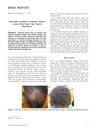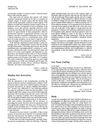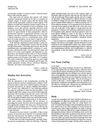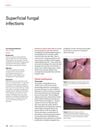 November 2024 in “PubMed”
November 2024 in “PubMed” Terbinafine can cause skin reactions when exposed to sunlight, so sun exposure should be avoided during treatment.
 36 citations,
January 2015 in “Dermatology”
36 citations,
January 2015 in “Dermatology” Bimatoprost was found to be safer and more effective than mometasone furoate for treating scalp hair loss.
 3 citations,
July 2015 in “Australasian Journal of Dermatology”
3 citations,
July 2015 in “Australasian Journal of Dermatology” A man developed an allergic skin reaction to a rosacea treatment and improved after stopping the medication and receiving allergy-specific care.
 14 citations,
July 2016 in “Pediatric Dermatology”
14 citations,
July 2016 in “Pediatric Dermatology” A 9-year-old girl with alopecia areata had successful hair regrowth using bimatoprost after other treatments failed.
 49 citations,
April 2000 in “Journal of The American Academy of Dermatology”
49 citations,
April 2000 in “Journal of The American Academy of Dermatology” Despite progress in treatment, the exact cause of Alopecia areata is still unknown.

The combination therapy effectively improved acne keloidalis nuchae.
 August 1998 in “Dermatologic Surgery”
August 1998 in “Dermatologic Surgery” Follicular unit hair transplantation is better than Miniflap Hair Restoration due to less scarring and more natural results.
 August 1998 in “Dermatologic Surgery”
August 1998 in “Dermatologic Surgery” Dr. George A. Farber recommends using follicular unit transplantation for hair restoration because it gives a more natural look and has fewer problems compared to the older miniflap technique.
 36 citations,
September 1999 in “Toxicologic pathology”
36 citations,
September 1999 in “Toxicologic pathology” Stronger corticosteroids cause more skin damage in hairless dogs, similar to effects in humans.
 23 citations,
April 1999 in “Dermatologic Clinics”
23 citations,
April 1999 in “Dermatologic Clinics” Pulsed-intense light can significantly reduce hair, with effectiveness depending on treatment number and timing, and has mild side effects.
 8 citations,
November 1990 in “International Journal of Dermatology”
8 citations,
November 1990 in “International Journal of Dermatology” Albendazole may cause hair loss.
 January 2003 in “American Journal of Clinical Dermatology”
January 2003 in “American Journal of Clinical Dermatology” In 2002, various skin reactions were reported due to different drugs, including allergies, hair loss, skin lesions, and other skin conditions.
 98 citations,
May 2008 in “British Journal of Dermatology”
98 citations,
May 2008 in “British Journal of Dermatology” There are many treatments for permanent hair loss disorders, but their effectiveness varies and there's no clear best option.
 88 citations,
July 2014 in “Journal of the American Academy of Dermatology”
88 citations,
July 2014 in “Journal of the American Academy of Dermatology” Targeted cancer therapies often cause skin reactions, so dermatologists must manage these effects.
 54 citations,
October 2019 in “Australian Journal of General Practice”
54 citations,
October 2019 in “Australian Journal of General Practice” Accurate diagnosis and treatment are crucial for managing superficial fungal infections, with terbinafine being the best oral treatment for nail infections.
 53 citations,
October 1978 in “Archives of dermatology”
53 citations,
October 1978 in “Archives of dermatology” Zinc supplements can resolve skin issues caused by zinc deficiency.
 48 citations,
May 1999 in “International Journal of Dermatology”
48 citations,
May 1999 in “International Journal of Dermatology” Alopecia areata is an unpredictable autoimmune hair loss condition, treated based on severity, with half of patients regrowing hair within a year without treatment.
 35 citations,
January 2006 in “Journal of Dermatological Treatment”
35 citations,
January 2006 in “Journal of Dermatological Treatment” Zinc can help with some skin problems, but its effectiveness varies depending on the condition.
 28 citations,
February 2010 in “British journal of dermatology/British journal of dermatology, Supplement”
28 citations,
February 2010 in “British journal of dermatology/British journal of dermatology, Supplement” WNT10A mutations cause varied symptoms in patients with odonto-onycho-dermal dysplasia.
 6 citations,
October 2022 in “American journal of clinical dermatology”
6 citations,
October 2022 in “American journal of clinical dermatology” The review shows how to properly diagnose and treat the loss of eyebrow and eyelash hair.
 6 citations,
April 2012 in “Lasers in surgery and medicine”
6 citations,
April 2012 in “Lasers in surgery and medicine” Laser hair removal can cause a severe itchy rash in some allergic individuals, treatable with steroids.
 3 citations,
March 2014 in “Annals of Hepatology”
3 citations,
March 2014 in “Annals of Hepatology” A man lost all his hair after stopping hepatitis C treatment and it didn't grow back.
 3 citations,
July 2008 in “British journal of dermatology/British journal of dermatology, Supplement”
3 citations,
July 2008 in “British journal of dermatology/British journal of dermatology, Supplement” Terbinafine can cause hair loss.
 2 citations,
November 1990 in “International Journal of Dermatology”
2 citations,
November 1990 in “International Journal of Dermatology” Albendazole can cause hair loss, and piroxicam can cause fixed drug eruption.
 January 2020 in “Nasza Dermatologia Online”
January 2020 in “Nasza Dermatologia Online” A mixture of Dijon mustard, turmeric powder, and linseed oil can effectively treat alopecia barbae.
 January 2018 in “Elsevier eBooks”
January 2018 in “Elsevier eBooks” Different nail disorders are treated by targeting their specific causes and using appropriate medications or protective measures.
 November 2013 in “John Wiley & Sons, Ltd eBooks”
November 2013 in “John Wiley & Sons, Ltd eBooks” Skin symptoms can indicate endocrine disorders and have various treatments.
 July 2008 in “British Journal of Dermatology”
July 2008 in “British Journal of Dermatology” Cyclosporin doesn't stop hair loss.
1 citations,
January 2017 in “International journal of trichology” Diphenylcyclopropenone (DPCP) effectively treated both alopecia areata and verruca vulgaris.
18 citations,
February 2021 in “Dermatologic therapy” Public interest in skin issues changed during COVID-19, with more focus on dry skin, hair problems, and hand eczema.




























